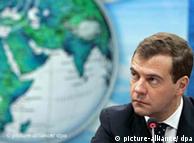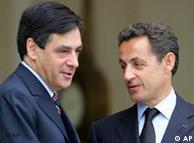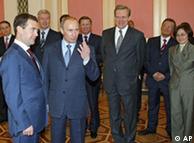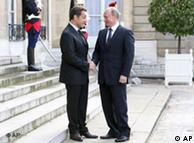international relations
Putin Feted as Head of State on Visit to France
Russian PM Putin discussed EU-Russia relations during a two-day visit to France, his first trip abroad since stepping down as head of state. His reception marked a break with the usual protocol for prime ministers.
Less than a month after his successor Dmitry Medvedev took over in the Kremlin, Vladimir Putin held talks with his French counterpart Francois Fillon before sharing a working dinner with President Nicolas Sarkozy at the Elysee palace.
Sarkozy's decision to meet Putin breaks with the past practice of Group of Eight leaders of dealing with Russia at the presidential level.
The special treatment accorded to Putin, who was president for eight years, underscored the view in Paris that he remains a predominant player in Russian affairs.
In turn, Russia is looking to France to help it improve its strained relations with the 27-nation European Union.
Putin won assurances from Fillon that Paris was ready to pull its weight:
"During the French presidency we would like to move forward and why not even conclude the strategic partnership agreement between Russia and the European Union," Fillon told reporters. France takes over the rotating EU presidency on July 1.
"We hope this will enable us to advance negotiations on a strategic partnership," said Putin.
Strategic partnership
 Bildunterschrift: Großansicht des Bildes mit der Bildunterschrift: Is Putin upstaging Dmitry Medvedev?
Bildunterschrift: Großansicht des Bildes mit der Bildunterschrift: Is Putin upstaging Dmitry Medvedev?
EU member states on Monday approved the launch of negotiations with Moscow on the new Partnership and Cooperation Agreement (PCA), which covers energy, trade and political ties.
After two years of acrimony over the issue caused by disagreements between Russia and eastern EU members, talks are now expected to start in June.
"We have agreed that we will together work for the earliest beginning of talks on a new strategic partnership," said Putin. "We paid a lot of attention to it during talks."
Putin also invited Europeans to invest in Russia, including its energy sector, citing the signature of the French oil giant Total last February of an accord to participate in a major oil project in the Barents Sea.
He said he regretted the amount of emphasis placed on primary materials in EU-Russian trade and urged development of high technology projects in the space, aeronautical and automotive industries.
The oil issue
 Bildunterschrift: Großansicht des Bildes mit der Bildunterschrift: Nicolas Sarkozy, right, with French Prime Minister Francois Fillon
Bildunterschrift: Großansicht des Bildes mit der Bildunterschrift: Nicolas Sarkozy, right, with French Prime Minister Francois Fillon
France was "open to Russian projects," said Fillon, who nonetheless stressed the need for a legal framework to develop such cooperation.
"Energy security in Europe depends on calm relations with Russia," he added, referring to concern in western Europe that Russia might try to exploit its gas and oil supplies to western Europe for political purposes.
Putin meanwhile deflected questions on whether Russia would be prepared to help France and other energy consumer nations cope with soaring oil prices.
"Russia is not the one setting the price of oil, but the market," Putin said. "If Russia were setting the price, then I think we could agree, but that is not the case -- not yet."
France earlier this week urged its partners in the G7 group of leading industrialized nations to press oil-producing nations to increase their output and lower oil prices that have hit record highs of more than $130 a barrel.
Russia is the world's second largest producer of oil and the number one supplier of natural gas.
NATO enlargement
The thorny question of enlarging NATO to include former Soviet republics Ukraine and Georgia -- opposed by Moscow -- was raised at the meeting later the same day with Sarkozy, said Fillon.
Following their working dinner, Sarkozy's office said in a statement that "the visit of Mr Putin to Paris only several weeks after the forming of a new Russian government is an indication of the desire of our two countries to maintain a regular dialogue at the highest level."
Human rights
 Bildunterschrift: Großansicht des Bildes mit der Bildunterschrift: The balance of power in Moscow has shifted
Bildunterschrift: Großansicht des Bildes mit der Bildunterschrift: The balance of power in Moscow has shifted
Putin evaded questions about human right violations -- another thorny issue in Russia-EU relations -- saying it was now the responsibility of President Medvedev.
"These kinds of questions are in the competence of the President of the Russian Federation," Putin said, adding that media reports about human rights violations in Russia were grossly exaggerated and used as a tool for political pressure.
Sarkozy has been accused in France of excessive warmth towards Russia and for failing to keep his pre-election pledges to press the Kremlin over its human rights record.

Comments